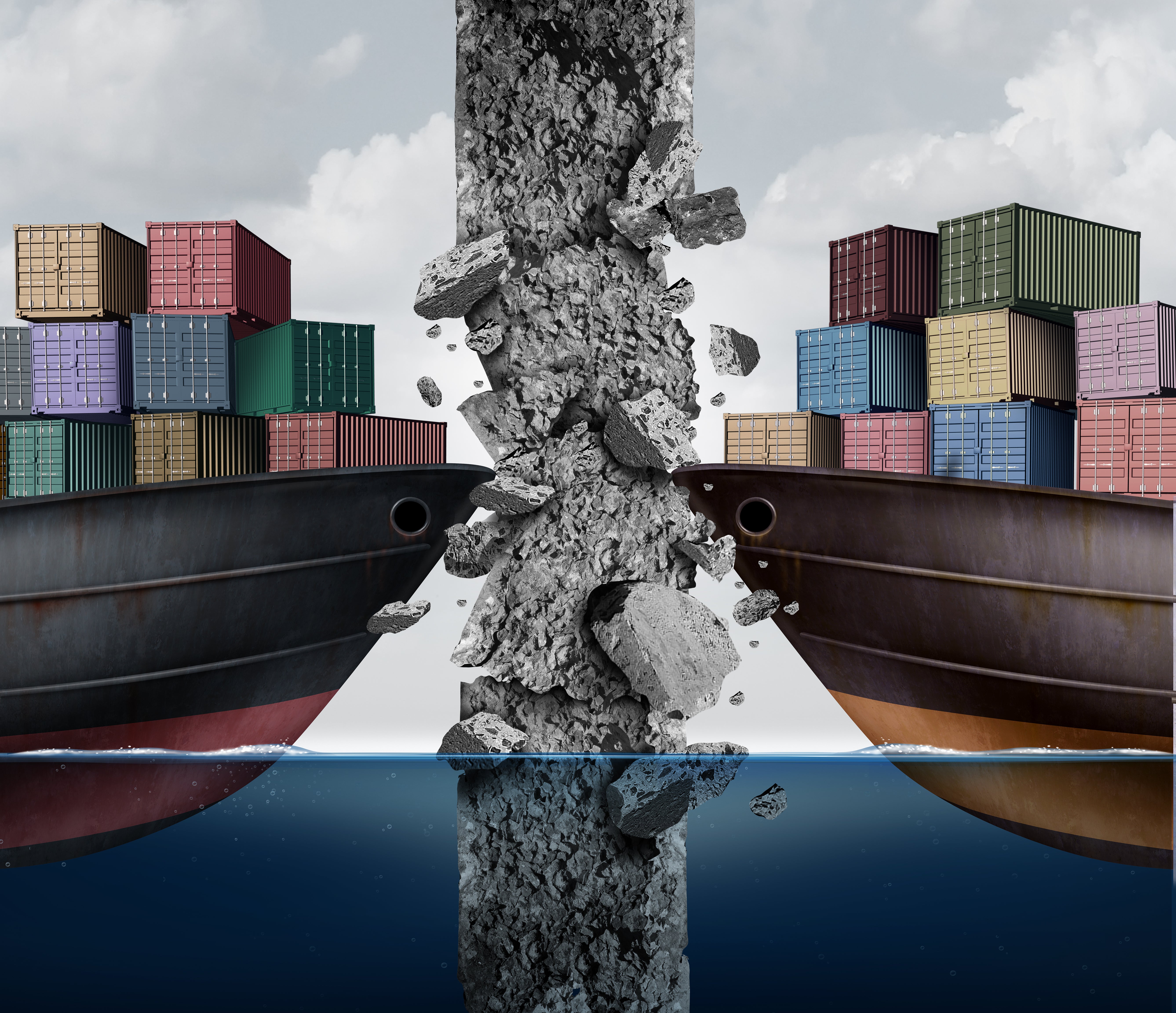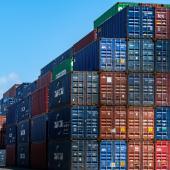Banner artwork by greenbutterfly / Shutterstock.com
As the COVID-19 pandemic has waned, many international supply chain bottlenecks have also begun to ease. As a result, in-house counsel and international trade lawyers may have begun to think globalization is back on track. It is tempting to believe that we are headed back to a world in which goods flow easily, heedless of national borders. The supply chain to manufacture a simple household coffee machine may snake through dozens of countries, guided only by Adam Smith’s “invisible hand” of economic efficiency. Globalization, after all, was the incarnation of Smith’s dream, according to which, each country makes products solely for which it has a “comparative advantage.”
Not so fast. One cannot assume that globalization will “naturally” get back on track now that the pandemic has ended since, contrary to conventional wisdom, there was never anything “natural” about globalization to begin with. Rather, globalization was the product of a specific set of geopolitical factors which arose at the end of World War II.
20th century origins
To be more precise, at war’s end, the United States found itself in a Cold War with the Soviet Union and needed to pull together a global alliance sufficiently broad and deep enough to contain Soviet imperialism. As a solution, according to geopolitical strategist Peter Zeihan, the United States agreed to patrol the world’s oceans to facilitate free trade among its allies and to provide those allies security and protection, as well as easy access to the US market, all in exchange for joining the US side of the Cold War.
The Cold War, however, effectively ended in 1989, and the strategic rationale for globalization ended along with it. Globalization has thus been unmoored for three decades, with some, like Tinglong Dai, an expert in globalization at Johns Hopkins Carey Business School, saying it is struggling to survive. “In the coming years, we may see the emergence of a ‘supply chain iron curtain,’ where Western countries maintain high levels of free trade, investment, and movement of people among each other but scrutinize links with China, Russia, and the like,” Dai told Al Jazeera news earlier this year.
Atlas shrugged
Some pundits expected the Biden administration to roll back the tariffs and other “America First” trade policies of the Donald Trump years. That hasn’t happened. Rather, Biden has doubled down on those policies.
To illustrate, the Section 301 tariffs Trump levied against US$350 billion of Chinese imports have remained firmly in place under Biden. Biden’s US Trade Representative Katherine Tai has merely kept in place certain narrow exclusions from these tariffs previously granted to US industry by Trump’s USTR.
Despite early talk of broadening such exclusions, as of this writing, Tai has not done so. Given that we are already in the opening phases of the 2024 presidential campaign cycle, and anti-China sentiment in Washington is one of the few topics on which both parties have found common ground, the 301 tariffs aren’t going anywhere.
Further evidence of America’s refusal to continuing underwriting globalization includes:
- The Biden Administration has continued to forcefully wield the hammer of the Enforce and Protection Act (EAPA), passed by Congress in 2015 to enhance compliance with American anti-dumping and countervailing duty laws and first aggressively implemented by the Trump administration. Since EAPA’s passage, Customs and Border Protection (CBP) has launched 174 investigations of alleged evasion of US antidumping rules. More than four out of five of these investigations have resulted in findings of evasion, greatly enhancing CBP’s collection of antidumping duties, according to the CBP’s Annual Antidumping and Countervailing Duty Enforcement Actions and Compliance Initiatives Report to Congress.
- The Generalized System of Preferences (GSP), the largest and oldest US trade preference program (enacted in 1974), is designed to help less developed countries gain low-tariff or no-tariff access to the US market. It was helping 119 beneficiary countries do so before it lapsed on Dec. 31, 2020. GSP has yet to be renewed, the longest period of lapse since the program was adopted. The current Congressional leadership has given no indication of when GSP may be renewed, because Congress is now dominated by anti-free trade factions.
- The Foreign Direct Product Rule (FDPR), after laying essentially dormant for much of the past decade, has recently been vigorously applied to essentially freeze the Chinese telecom maker Huawei out of the global semiconductor supply chain. Huawei’s revenues plunged 29 percent in 2021 alone as a result. The FDPR, which asserts extraterritorial American jurisdiction around the world, can be used to restrict the export of American technology from any country in the world (not just the United States) to a targeted country such as China. The United States also used the FDPR to close off the Russian defense industry to American technology from anywhere in the world, even third-party countries.
- To drive home the “Huawei message,” the Biden administration recently signed Japan and the Netherlands to an agreement to limit their exports of advanced semi-conductor chips to China. This agreement will effectively prevent China from accessing cutting-edge chips since America, Japan, and the Netherlands dominate the making of these chips globally. Chips are the lifeblood of 21st century modern economies in the way that oil was the lifeblood of 20th century economies.
- In 2018, Congress substantially beefed up the powers of the Committee on Foreign Investment in the US (CFIUS) to review or block foreign investment in the United States by passing the Foreign Investment Risk Review Modernization Act (FIRRMA). This act expanded the writ of CFIUS to act on deals deemed to post a national security threat to the United States, including transactions involving the acquisition of passive, non-controlling interests in US companies. FIRRMA also covers investments in a wide range of “critical” technology and infrastructure and the collection of sensitive personal data. The Department of the Treasury followed up these developments by issuing its first ever “CFIUS Enforcement and Penalty Guidelines” publication in October 2022.
- The United States has repeatedly weaponized the dollar for diplomatic, security, and economic purposes, under both Trump and Biden. The latest and most dramatic example of this phenomenon was the United States carving Russia out of the global SWIFT banking system. Long considered a financial “nuclear option,” kicking Russia out of SWIFT effectively crippled its Central Bank’s access to the country’s overseas reserves and forced Russia into an international barter system for goods. This action was part of the most aggressive overall sanctions regime in US history, imposed against Russia because of the Ukrainian invasion.
Chips are the lifeblood of 21st century modern economies in the way that oil was the lifeblood of 20th century economies.
No going back
So, there is no going back to the good ol’ days of 2019.
What does the end of globalization mean for the practice of law? For one, it means that many of the legal obstacles to cross-border trade that have emerged over the past seven years, including tariffs and non-tariff trade barriers, are here to stay (and likely to thicken). Lawyers advising clients with operations abroad, including overseas supply chains, foreign production operations, or foreign customers, must be aware of these tectonic geopolitical shifts if they are to see over the horizon and not get caught out by sudden supply chain crises.

For in-house counsel in particular, de-globalization means that challenging days lie ahead. In-house counsel may, from one day to the next, see entire countries drop out of their employer’s supply chain, as happened with Russia just weeks following its invasion of Ukraine. Russia is one of the largest exporters in the world of not only oil and gas, but wheat, fertilizer, nickel, semi-finished iron and dozens of other products. Some unlucky in-house counsel whose employers relied on these products suddenly found themselves, in the spring and summer of 2022, scrambling to find alternative suppliers in non-sanctioned countries.
In-house counsel may, from one day to the next, see entire countries drop out of their employer's supply chain, as happened with Russia just weeks following its invasion of Ukraine.
Other in-house counsel found themselves struggling to decipher the stream of often broadly worded and vague Executive Orders coming from the White House in order to understand with whom they were allowed to do business inside Russia, on what terms and for what products. Still others had to begin asking their customers who their customers were, since most US sanctions not only forbid direct trade with Russia but also indirect trade; i.e., selling to customers who then sell to Russia.
Another of the most significant results of de-globalization for lawyers has been the ongoing de-coupling of the US and Chinese economies. Because of this de-coupling, in-house counsel must now pay much closer attention to, for example, “country of origin” rules for a host of products in their employer’s supply chains. As it has begun to sink in that the Section 301 tariffs on China are here to stay, and as China has been the target of so many antidumping investigations, many in-house lawyers are for the first time having to wrestle with what constitutes a product “Made in China,” and thus subject to the 301 regime.
Because of the de-coupling, in-house counsel must now pay much closer attention to, for example, "country of origin" rules for a host of products in their employer's supply chains.
Likewise, country of origin rules can determine whether a given product is subject to an antidumping order targeting China or whether that product, despite having some Chinese inputs, nonetheless “originates” in another country such as Vietnam. The costs of mistakes in making these evaluations frequently carry enormous customs duties and penalties.
As a result of de-globalization, US lawyers should also anticipate that our trading partners will put up barriers in response to many of the Trump/Biden “America First” policies emanating from Washington. For example, bipartisan passage of the recent CHIPS and Science Act of 2022, which put US$53 billion of taxpayer money into the US semiconductor industry, has led to a wave of discussions in foreign capitals on how to counter this enormous subsidy. Regulatory and tariff changes in the European Union and Asia, as well as counter-subsidies to protect local chip makers, are likely to be the result.
Since World War II, American lawyers and their business clients have had the luxury of largely ignoring national borders in deciding where to do business overseas. That era has ended. In the new world order, national borders are back with a vengeance. Lawyers must understand how to navigate in these new waters, which include the complex trade laws of both the United States and its trading partners, if they are to effectively advise their employers and clients and avoid the shoals ahead.
Disclaimer: The information in any resource in this website should not be construed as legal advice or as a legal opinion on specific facts, and should not be considered representing the views of its authors, its sponsors, and/or ACC. These resources are not intended as a definitive statement on the subject addressed. Rather, they are intended to serve as a tool providing practical guidance and references for the busy in-house practitioner and other readers.





